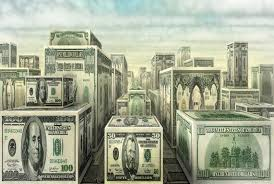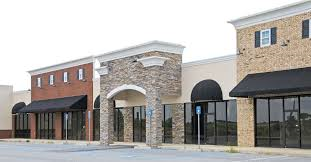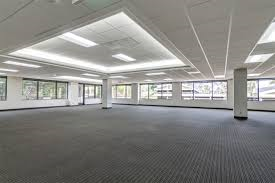Is Commercial Real Estate Right for Your Real Estate Portfolio
Is Commercial Real Estate Right for Your Real Estate Portfolio
Whether
you already own residential rental properties or you are still deciding
if real estate investing is how you want to build wealth, the idea of
purchasing commercial real estate may have crossed your mind.

According
to Melvin Feller MA, a Real Estate Investor, the first, and best,
reason to put capital into commercial real estate investing, versus only
residential, is the income potential. On average, commercial property
has a usual annual return off the purchase price between 6 to 12
percent. Single-family rentals, to provide contrast, generally generate a
1 to 4 percent return at best. One factor that can help secure such
profits are higher lease payments per square foot than is typically seen
for residential or single-family apartments.
Commercial
property is either specific buildings or land that is profit
generating. It can also apply to residential properties that contain
five or more units. However, for the most part, the term ‘commercial
property’ normally includes:
Office buildings
Retail buildings
Warehouses
Industrial buildings
Mixed-use buildings
As
Melvin Feller again points out, each type of commercial real estate has
its distinct characteristics regarding management and usage. However,
they all fall under the general umbrella of ‘commercial,’ rather than
‘residential.’ All of them are able to generate or indirectly help
generate income for businesses.

Commercial real estate includes any non-residential property used solely for business purposes.
Investing
in commercial real estate is very different from residential real
estate investing so before you can start calculating potential profits
of a commercial real estate deal there are many things to do and know
about this type of investing.
Commercial
real estate is at the top of many investors’ wish lists, and for good
reason: it has proven to be a lucrative endeavor repeatedly. However, if
you want to buy commercial property it is important to understand that
increased reward can also mean increased responsibility. That is why it
is crucial to mind your due diligence and follow sound practices.
As
you might expect, commercial properties are a departure from
traditional single-family investments. From crunching numbers to raising
capital, buying commercial real estate will require more out of an
investor. That said, with the right dedication you can learn how to take
on properties that are more complex. The following guide will walk you
through how to buy commercial real estate and help you get started
today.
How to Buy Commercial Property in Seven Steps
Identify your motivations for investing.
Evaluate different commercial property types.
Lock down your financing.
Build the right team for the job.
Identify a potential property in your market.
Run the numbers on the property.

Make an offer and close the deal.
Buying
commercial properties can be thought of similarly to purchasing
traditional real estate, but on a bigger scale. Investors will still
need to conduct sufficient research and mind due diligence; but there
will be differences in the numbers. Commercial properties often equate
to higher purchase prices, longer leases, and increased rental income.
To prepare for these differences, investors should ensure they have the
right systems in place. Not surprisingly, as you gain experience you
will become comfortable analyzing properties and landing deals.
If
you want to start purchasing commercial real estate, or you simply want
a better idea of what to expect, consider the most important steps in
the commercial real estate buying process:
1. Ask Yourself Why You Are Investing
Before
you can even consider buying commercial real estate, you need to ask
yourself why you are doing so in the first place. There is no point in
investing in a commercial asset if you do not know what you hope to
accomplish. Instead of investing first and determining what you want
later, try identifying your “why” first. Determine what you want to
accomplish, and then search for an investment that can help you achieve
that goal.
2. Consider Your Investing Options
Commercial
real estate is a broad term, and can include everything from retail
shops, industrial complexes, office buildings, large apartment buildings
and a whole slew of other types of commercial real estate. In other
words, commercial real estate is property used for business purposes. It
is, therefore, in your best interest to determine which type of
commercial real estate you want to deal in. To help you with your
decision, remember why you are investing in the first place.
3. Secure Financing
Try
to secure financing before you even start looking for a commercial real
estate property to buy. That way, you will not only know how much you
can afford, but you will be able to facilitate a deal faster and more
efficiently with the money “in hand.”

4. Align Yourself with the Right People
Real
estate is a people business, and buying commercial real estate is no
exception. You will want to make sure you align your services with the
right professionals. Consider hiring a commercial real estate agent that
specializes in the types of transactions you hope to complete, a
commercial real estate attorney well versed in the laws of commercial
real estate, and even a certified personal accountant (CPA) to make sure
the deal goes according to plan. Several professionals can help you in
regards to selecting the right property. The right partners may be the
key to landing the deal of your dreams.
5. Find a Property That Meets Your Criteria
With
everything in place, begin your search. By now, you should know your
criteria; stick to it. Remember why you are buying commercial real
estate, and look for a property that can get you to the finish line.
Remember, there is no reason in buying a property that does not help you
realize your goal, no matter how good of a deal it may seem on the
surface.
6. Mind Due Diligence
Again,
buying commercial real estate is not the same as buying a single-family
home. Before you proceed, mind due diligence. Run the numbers and
analyze the deal as a whole. Are the inherent risks worth the potential
rewards? Is there another property that would be better suited towards
your goals? Now is the time to analyze every detail. Only move forward
once you are certain the property will be beneficial to your portfolio.
7. Close the Deal
Once
you find a property worth pursuing, be sure to make an offer with a
contingency clause. More specifically, make an offer with an inspection
contingency that gives you an out in the event the commercial property
does not pass the inspection. If everything looks good, continue to mind
due diligence by getting the appropriate insurance set up and reviewing
all included documents. There is a lot that goes into a commercial real
estate transaction, so make sure you are prepared.

I
want to make it abundantly clear: this is by no means a comprehensive
list of every step associated with buying commercial real estate. It is,
however, representative of some of the most important steps you should
never forget. To be clear, you should consult a professional before
moving forward with your own commercial real estate purchase.
Is Buying Commercial Property A Good Investment?
Yes,
buying commercial property has proven to be a smart investment for
those who know what to expect. The income potential alone is what draws
so many real estate investors to this asset type.
Commercial real estate
is known to have a higher return on investment when compared to
residential properties. Aside from the profitability, buying commercial
real estate can also lead to stronger professional relationships, more
flexible lease terms and limited business hours. Investors who opt for
commercial real estate will also enjoy attractive financing options and
equity appreciation.
In
order for commercial real estate to be a smart investment, there is one
thing you will need to look for first: an experienced commercial real
estate broker. Nothing else will be worth as much to your search or help
you over the course of a commercial real estate deal more so than a
professional that is well versed in commercial real estate. Moreover,
while their services will certainly set you back (somewhere in the
neighborhood of six percent of the purchase price), I can assure you it
is usually worth it. A great commercial real estate attorney will help
you every step of the way, from finding a deal to negotiating terms and
prices. In fact, it is entirely possible for a good agent to save you
more money than their services cost.
Once
you have a commercial real estate professional on your side, begin to
explore the different types of commercial properties on the market.
Whether you realize it or not, there are significant differences between
office buildings, industrial properties, retail properties, apartment
buildings, and every other type of commercial real estate. It is in your
best interest to know them all. Be careful to vet the options made
available to you. Look at the types of commercial real estate up for
sale, and determine which type of property suits your needs. What the
property is zoned for will have a big impact on how you proceed, so it
is best to know what you are getting into ahead of time.

Buying Commercial Real Estate Questions to Ask
At
this point, you may still have questions about commercial real estate,
and that is okay. Learning to take on more complex investing strategies
takes time and research. If you still have questions on how to buy
commercial property, there are resources you can use. The following
questions about buying commercial real estate can help:
Why is the owner selling in the first place?
Not
unlike every other investment strategy, buying commercial real estate
will work out more often than not for those that mind due diligence.
More importantly, the more you know about a respective deal, the better
off you will be, and the reason behind the sale is no exception. That
said, uncover the exact reason the current owner is intent on selling.
Not only will the answer be able to help you in negotiations, but also
it could point to any red flags that are best left avoided. Just
remember one thing: sometimes the best choices you make are the ones you
do not make.
What are the different types of commercial real estate, and why should I care?
Commercial
real estate represents a lot more than simply shipping centers and
restaurants. These properties can be anything from retail stores to
hotels and office buildings, and many things in between. As such, each
commercial property is most likely zoned according to its purpose, and
that zoning is important for you to pay attention to. Perhaps even more
importantly, the zoning will determine what you can do with the property
if you buy it, so be aware. Make certain the zoning laws fit with your
strategy.
Why should I invest in commercial real estate over single-family homes?
Commercial
real estate boasts one benefit that single-family homes have a hard
time matching: the value of scale. Do to the sheer size of most
commercial buildings, at least as they compare to traditional homes,
commercial buildings offer the potential for larger profits. It is also
nice knowing most of your tenants will have a stake in the property,
which means you are less likely to deal with unruly tenants. Business
owners are typically more inclined to treat the property with respect
because it is, after all, their own livelihood.

Buying Commercial Property Tips
Learning
how to buy commercial properties has become the next logical step for
many investors that have grown comfortable dealing in single-family
homes. If for nothing else, commercial real estate represents the next
challenge or exit strategy that can elevate your investing career to an
entirely new level. While buying commercial real estate can certainly
coincide with amazing benefits, it is not without a few downfalls: risk,
difficulty, and the sheer volume of capital required to deal in
commercial real estate can all impede an investor’s progress.
It
is worth saying, however, that buying commercial real estate is not
impossible. Not unlike buying single-family homes, there is a process;
one that, if followed correctly, can result in amazing benefits. That
said, you must know what you are doing if you hope to realize success in
the commercial industry. Jumping in without a plan is the surest way to
sabotage your own efforts and ruin everything you worked so hard to
achieve.
If
you want to successfully, make the transition to commercial real estate
familiarize yourself with the commercial real estate buying process.
Here are a few buying commercial property tips to help:
Learn The Language:
There can be a learning curve when making the transition from
residential to commercial real estate, so you may need to go back to
basics before you get started. Familiarize yourself with terms and
concepts commonly used in commercial real estate, like capitalization
rate and building classification. Reviewing the language will help make
sure you are comfortable when talking to potential business partners,
tenants and especially lenders.
Find A Market:
Just like with any real estate investment, location is everything. It
is common for commercial real estate investors to venture outside of
their market area, or to invest in multiple markets. Analyze each market
you may want to invest to find the right area to invest. Do not be
afraid to choose high performing markets simply because they are outside
of your local area or state.
Work with Your Mentor:
A mentor is crucial for any real estate investor, but they can be
especially helpful when it comes to more complex investing strategies
like commercial properties. Attend real estate networking events in your
area or ask your existing connections to meet someone with experience
in commercial investing. As you build a relationship over time, their
advice and insights could help as you build a portfolio.

Visit Properties:
As you start identifying potential properties, make sure to visit each
of them. This will give you a better idea of what to expect if you
choose to move forward with the deal. Even if you do not plan to manage
the property yourself, it is still a good idea to picture what the
building will be like. Visiting properties can even help you narrow down
your options if you have more than one investment you are trying to
choose between.
Protect Your Assets:
Before you move forward with your first commercial deal, make sure the
rest of your assets are properly protected. Look into the way your
business is currently organized and how a commercial property will fit
into that. Research different types of liability insurance and business
structures before taking on more complex properties.
Buying
commercial real estate can certainly be well worth your time if you do
it correctly. Perceptive commercial real estate investors have already
proven that it belongs in a well-rounded portfolio, but I digress. For
as beneficial as it can be to own commercial real estate, it can be
equally devastating for those that go in without a plan. If for nothing
else, commercial real estate investing comes with risks for those that
act irrationally. Poor investment practices could result in devastating
problems, and they are only magnified by the size of commercial
investments. Therefore, it pays to have a sound plan in place. With
proven systems on your side, you are more likely to avoid the pitfalls
of commercial investing and realize success.
Melvin Feller is known as “The Entrepreneur’s Mentor” because Melvin walks his talk.
Melvin Feller has been there and done that and more importantly, Melvin
Feller knows how to transfer the skill set for success. This is main
reason that he has been the sought after coach to hundreds of small
business owners, entrepreneurs, Realtors, real estate investors and
service professional internationally. Melvin
Feller’s main talent is to show you how the step by step process to
build and enjoy a successful 6-figure plus business while having a
balanced life. Melvin Feller maintains offices in Texas and Oklahoma.
Comments
Post a Comment